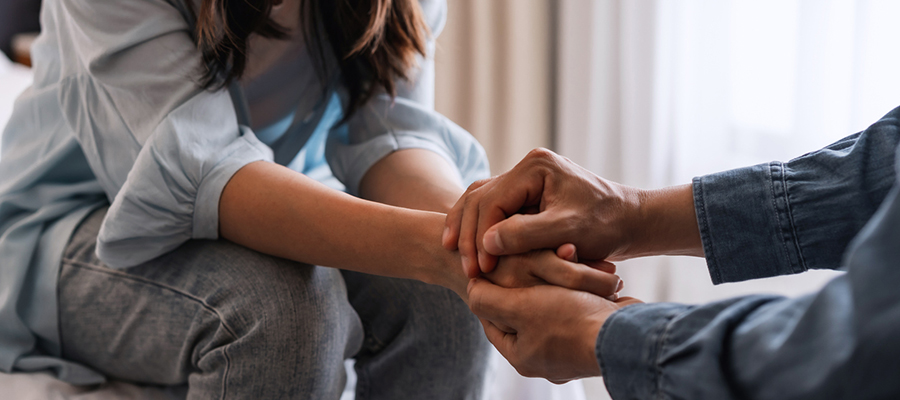‘Everybody has a different story’: How compassionate connections are helping to support birth parents

This Adoption Week Scotland, Melanie Thomson, a Social Worker for the Bluebird Project at Scottish Adoption, which offers counselling and support to birth parents, and birth mothers who currently take part in the Bluebird Project, share why compassionate, nurturing peer support is so important.
The quotes in this blog post are from birth mothers who have spoken about their experiences as part of the Bluebird Project and have agreed for them to be shared.
“After I was adopted, who was looking out for my birth Mum?” This question was put to me over three years ago, by a then 16-year-old member of our adoption teen group. I paused, took a breath, and tried to think of an honest, but gentle response.
In truth, I suspected that the answer wasn’t positive. Despite the fact that losing a child is arguably one of the most traumatic experiences a parent can experience, the support offered within the Scottish Permanence system can feel tainted, unsafe and is then rarely taken up.
This memory resurfaced recently within my work as a facilitator for Scottish Adoption’s newest venture, Project Bluebird, which launched in July 2022. The project provides counselling, group-work and outreach support to any birth mother or father who has permanently lost their child to fostering, adoption or kinship care in Edinburgh and the Lothians. Support can be given to birth parents who still have ongoing contact with their children, or it could start in the months leading up to final contacts. We also see parents in the immediate aftermath of losing care of their child/ren or any time in the years that follow:
“What people don’t realise is, there’s no timeline with this [loss]. It might have happened 27 years ago, or yesterday, but it [loss] still feels the same”.
‘Everyone has a different story – but there are strong themes that connect their narratives’
During my time with this group, I’ve had the privilege of hearing the stories and experiences of a group of brave birth mothers, - or to use the language which is inclusive of their identity - mothers:
“After I lost my son, I had no one to talk to. My family had stopped speaking to me and no one offered support. I felt I couldn’t find anyone to speak about what had happened. You don’t know what people will think of you”.
Every parent who accesses Bluebird has a different story, but there are strong themes that connect their narratives. Domestic abuse, loneliness and shame have all been spoken of, and an agreement that any problems that existed before went on to become worse:
“When I lost both my girls, I was just told good luck in the future. I couldn’t talk to anyone. You just know that other people either won’t understand or you’ll be judged. You believe that if you tell people, they’ll assume you’re a horrible person. I felt so terrible and so alone”.
What we know is that people need to feel safe before they can work with us. Due to this, Bluebird has a soft landing into the services. Our first-steps workers will provide outreach and meet people within their own communities:
“I spent time getting to know Lynsey. She visited me in rehab. She’s not like any Social Worker I’ve worked with before. She took me to my final visit with my child. It was so hard, but we made handprint art together. A precious memory. One for each of us and I don’t think I could have gone to that visit without support. Now we’re collecting photos, as most have been damaged, so she’s helping me get them restored. We’ll pass them on for his memory box and I’ll have copies too”.
This powerful story was shared in the opening minutes of our first Bluebird meet-up and although the women had never met before that day, I was blown away by what I heard and what I felt in the room:
“I promise you, you will feel better than this one day. It never goes away, but it will get better”.
Peer support and connection offer hopes for the future
This kind of response is why peer support is so effective. No one can offer reassurance like someone who has walked in your shoes and those with a lived experience can offer advice in a different way to professionals. Likewise, peer support impacts positively not just on those that are on the receiving end of advice, but also for those that choose to share their story:
“I come here to meet my worker on my own because it’s good to talk. I live on my own and it builds up in your chest. You can feel it here. When I’m in this group, talking about what you’ve been through helps other people. You feel good to think you’ve helped them feel less alone”.
It’s very early days for the project but the impact it has had on a small group of brave women is incredibly encouraging:
“I see so much potential for Bluebird, it has the power to give people hope and to help them build back their life”.
With this thought to the future, I feel hopeful too. We can’t take away the pain of losing a child, but we do have the power to ensure that nurture and compassion is available and next time a young person asks me, who is there to look after birth parents, I can say, ‘we do!’
The views expressed in this blog post are those of the author/s and may not represent the views or opinions of CELCIS or our funders.
Commenting on the blog posts: sharing comments and perspectives prompted by the posts on this blog are welcome.
CELCIS operates a moderation process so your comment will not go live straight away.


